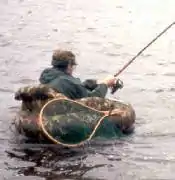
The ice jigger also known as prairie ice jigger, or prairie jigger, is a device for setting a fishing net under the ice between two ice holes, invented by indigenous fishermen of Canada in early 1900s.[1]
The jigger consists of a slotted wooded board that floats under the ice surface and two levers connected in such a way that when a rope connected to one lever (arm) is pulled, the second lever (leg) jabs into the ice and pushes against the ice to move the board in the direction opposite to the rope pull. After each pull a spring resets the arm, and the action is repeated. In this way a person by an ice hole propels the jigger away. If the ice is transparent enough, one just makes another hole over the jigger when it moves far away. (Otherwise the progress of the jigger may be monitored by the tapping noise of the jigger's leg.)[1] After that the jigger is pulled out of the second hole, together with the rope, and the net may be stretched under the ice using the rope from one hole to another.[2][3][4][5][6][7][8]
The simple and effective design remained basically unchanged since its invention.[1] Imler (1971)[9] described the use of a radio transmitter to locate the jigger under heavy ice cover by Colorado fishery biologists.[10]
References
- 1 2 3 "Manitoba Fisheries Sustainable Development - Grade 5". Archived from the original on 2003-07-19. Retrieved 2015-08-13.
- ↑ Arctic Fishing - Ray Mears World of Survival, BBC
- ↑ W. M. Sprules, "The “prairie ice jigger”", Polar Record / Volume 8 / Issue 56 / May 1957, pp 441-444, doi:10.1017/S0032247400049640
- ↑ "Fishing net jigger used to pull nets under the ice | Collections Search Center, Smithsonian Institution". collections.si.edu. Retrieved 2015-08-13.
- ↑ Popular Science Feb 1963, p. 147
- ↑ Downie, N.A. (2006). Exploding Disk Cannons, Slimemobiles, and 32 Other Projects for Saturday Science. Johns Hopkins University Press. p. 71. ISBN 9780801885075. Retrieved 2015-08-13.
- ↑ "WebWaves | Fisheries and Oceans Canada". waves-vagues.dfo-mpo.gc.ca. Retrieved 2015-08-13.
- ↑ "Ice fishing - YouTube". youtube.com. Retrieved 2015-08-13.
- ↑ Richard Imler, Radio Telemetry as an Aid in Winter Gill Netting, The Progressive Fish-Culturist Volume 33, Issue 1, 1971, doi:10.1577/1548-8640(1971)33[59:RTAAAI2.0.CO;2]
- ↑ Hamley, John M. "Guidelines for Sampling Fish in Inland Waters". fao.org. Ontario, Canada: Ontario Ministry of Natural Resources. Archived from the original on 26 January 2021. Retrieved 26 January 2021.
